美苏冷战 英文
- 格式:ppt
- 大小:287.50 KB
- 文档页数:22
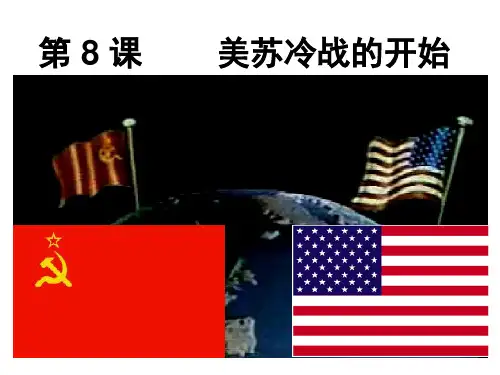
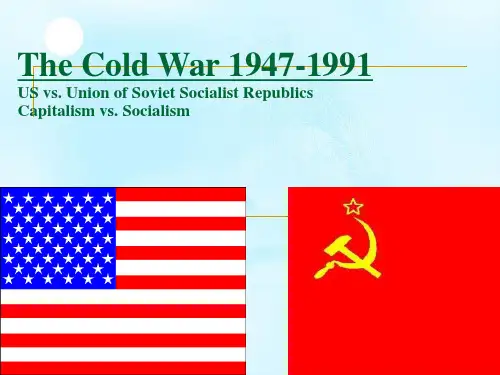

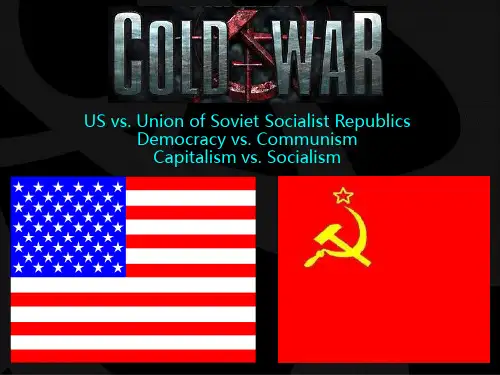
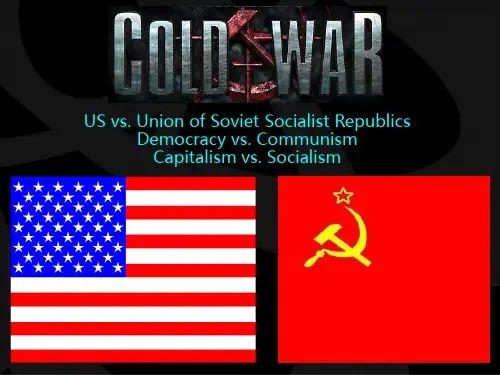

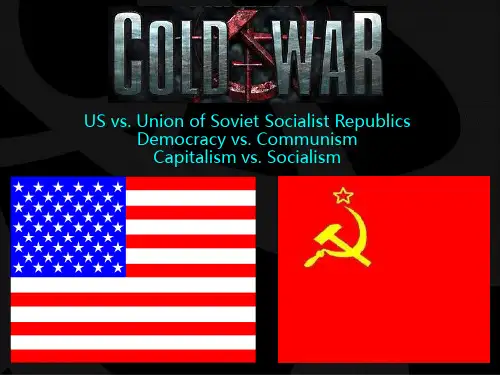
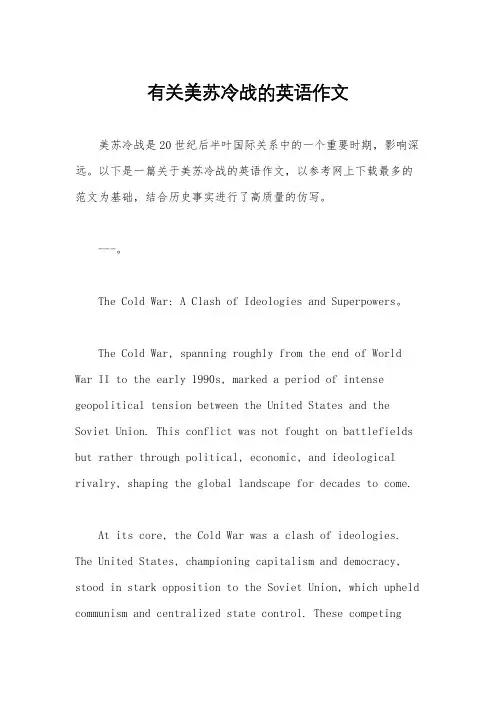
有关美苏冷战的英语作文美苏冷战是20世纪后半叶国际关系中的一个重要时期,影响深远。
以下是一篇关于美苏冷战的英语作文,以参考网上下载最多的范文为基础,结合历史事实进行了高质量的仿写。
---。
The Cold War: A Clash of Ideologies and Superpowers。
The Cold War, spanning roughly from the end of World War II to the early 1990s, marked a period of intense geopolitical tension between the United States and the Soviet Union. This conflict was not fought on battlefields but rather through political, economic, and ideological rivalry, shaping the global landscape for decades to come.At its core, the Cold War was a clash of ideologies. The United States, championing capitalism and democracy, stood in stark opposition to the Soviet Union, which upheld communism and centralized state control. These competingideologies fueled a race for global dominance, leading to a series of proxy wars, arms races, and ideological battles across the world.One of the defining features of the Cold War was the arms race, particularly in nuclear weapons. Both the U.S. and the Soviet Union stockpiled vast arsenals of nuclear missiles, leading to a doctrine of mutually assured destruction (MAD), where the threat of nuclear retaliation kept both sides in check. This arms race heightened global tensions and created a constant state of fear and anxiety known as the "nuclear standoff."Proxy wars also characterized the Cold War era, as both superpowers sought to spread their influence and ideology to other nations. Conflicts in Korea, Vietnam, and Afghanistan were among the most notable proxy wars, where the U.S. and Soviet Union supported opposing factions, often leading to prolonged and devastating conflicts with far-reaching consequences for the affected regions.The space race was another manifestation of the ColdWar rivalry, with both superpowers competing to achieve milestones in space exploration as a symbol oftechnological and ideological superiority. The launch of Sputnik by the Soviet Union in 1957 marked the beginning of this competition, followed by the U.S. Apollo program landing astronauts on the moon in 1969.While the Cold War was characterized by intense rivalry, it also witnessed moments of détente, where both sides engaged in diplomatic efforts to reduce tensions and avoid direct confrontation. The Strategic Arms Limitation Talks (SALT) and the Helsinki Accords were examples of such efforts, albeit temporary, to ease the nuclear threat and promote dialogue between the superpowers.The end of the Cold War came with the gradual collapseof the Soviet Union in the late 1980s and early 1990s. Economic stagnation, internal unrest, and the inability to compete with the U.S. on multiple fronts contributed to the Soviet Union's decline. The fall of the Berlin Wall in 1989 symbolized the end of divided Europe and marked a turning point in global politics, leading to the eventualdissolution of the Soviet Union in 1991.In conclusion, the Cold War was a multifaceted conflict driven by ideological differences, power struggles, and global competition between the United States and the Soviet Union. Its legacy continues to shape internationalrelations and security policies, highlighting the complex dynamics of superpower rivalry and the enduring impact of historical conflicts on the modern world.。
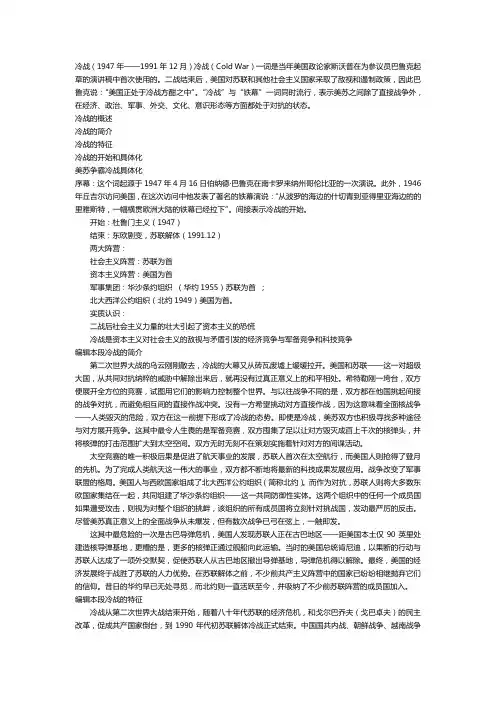
冷战(1947年——1991年12月)冷战(Cold War)一词是当年美国政论家斯沃普在为参议员巴鲁克起草的演讲稿中首次使用的。
二战结束后,美国对苏联和其他社会主义国家采取了敌视和遏制政策,因此巴鲁克说:“美国正处于冷战方酣之中”。
“冷战”与“铁幕”一词同时流行,表示美苏之间除了直接战争外,在经济、政治、军事、外交、文化、意识形态等方面都处于对抗的状态。
冷战的概述冷战的简介冷战的特征冷战的开始和具体化美苏争霸冷战具体化序幕:这个词起源于1947年4月16日伯纳德〃巴鲁克在南卡罗来纳州哥伦比亚的一次演说。
此外,1946年丘吉尔访问美国,在这次访问中他发表了著名的铁幕演说:“从波罗的海边的什切青到亚得里亚海边的的里雅斯特,一幅横贯欧洲大陆的铁幕已经拉下”。
间接表示冷战的开始。
开始:杜鲁门主义(1947)结束:东欧剧变,苏联解体(1991.12)两大阵营:社会主义阵营:苏联为首资本主义阵营:美国为首军事集团:华沙条约组织(华约1955)苏联为首;北大西洋公约组织(北约1949)美国为首。
实质认识:二战后社会主义力量的壮大引起了资本主义的恐慌冷战是资本主义对社会主义的敌视与矛盾引发的经济竞争与军备竞争和科技竞争编辑本段冷战的简介第二次世界大战的乌云刚刚散去,冷战的大幕又从砖瓦废墟上缓缓拉开。
美国和苏联——这一对超级大国,从共同对抗纳粹的威胁中解除出来后,就再没有过真正意义上的和平相处。
希特勒刚一垮台,双方便展开全方位的竞赛,试图用它们的影响力控制整个世界。
与以往战争不同的是,双方都在他国挑起间接的战争对抗,而避免相互间的直接作战冲突。
没有一方希望挑动对方直接作战,因为这意味着全面核战争——人类毁灭的危险,双方在这一前提下形成了冷战的态势。
即便是冷战,美苏双方也积极寻找多种途径与对方展开竞争。
这其中最令人生畏的是军备竞赛,双方囤集了足以让对方毁灭成百上千次的核弹头,并将核弹的打击范围扩大到太空空间。
双方无时无刻不在策划实施着针对对方的间谍活动。
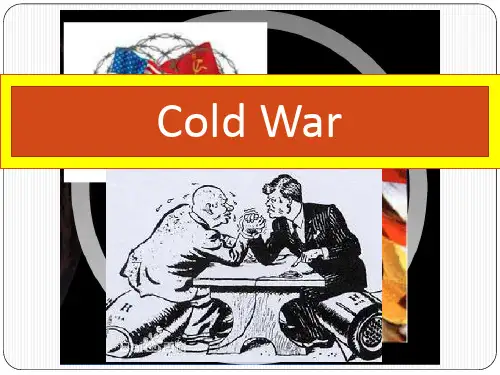
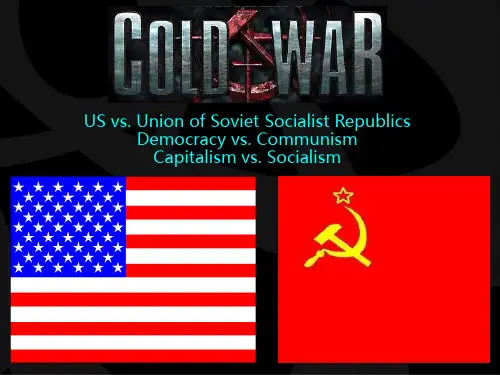
美苏冷战英语作文600字英文回答:The Cold War, a global rivalry between the UnitedStates and the Soviet Union, marked an era of geopolitical tension, ideological clashes, and military buildup. This multifaceted conflict left an enduring impact oninternational relations, shaping the second half of the20th century.Ideologically, the Cold War represented the clash between capitalism and communism. The United States, a capitalist democracy, espoused values of individual freedom, economic liberty, and limited government. In contrast, the Soviet Union, a communist state, advocated for centralized authority, a centrally planned economy, and the supremacyof the collective over the individual. This ideological divide fueled mutual distrust and a drive to establish spheres of influence around the world.Militarily, the Cold War was characterized by an arms race that pushed the limits of science and technology. Both superpowers developed nuclear arsenals capable of devastating each other's territories, creating a doctrine of "mutually assured destruction." This precarious balance of terror dictated that neither side could engage in afull-scale war without risking unimaginable consequences.The Cold War also manifested in covert operations, propaganda campaigns, and intelligence gathering. Both superpowers sought to undermine the other's influence and gain strategic advantages. CIA-backed covert operations attempted to destabilize communist regimes, while KGB's espionage activities aimed to penetrate Western governments and collect information.The rivalry between the United States and the Soviet Union extended beyond geopolitical and ideological realms. It permeated every aspect of society, from political rhetoric to cultural expression. The "Red Scare" in the United States fueled anti-communist sentiments and the fear of Soviet infiltration. In the Soviet Union, patrioticpropaganda extolled the virtues of communism and cast the United States as an imperialist aggressor.The Cold War profoundly shaped post-World War II international relations. It divided the world into two antagonistic blocs, the Western alliance led by the United States and the Eastern Bloc dominated by the Soviet Union. Regional conflicts, such as the Korean War and the Vietnam War, became proxies for the superpower rivalry.Despite the inherent tension and the threat of nuclear annihilation, the Cold War also had periods of détente. Notably, the Cuban Missile Crisis in 1962 brought the world to the brink of nuclear war but also led to a thaw in relations and the establishment of a "hotline" for direct communication between the two leaders.Eventually, a series of factors, including economic stagnation in the Soviet Union, internal political reforms, and the rise of Mikhail Gorbachev, contributed to the easing of tensions and the eventual end of the Cold War in 1991. The collapse of the Soviet Union marked a seismicshift in global power dynamics and ushered in a new era of international relations.中文回答:冷战,美国與蘇聯之間的全球競爭,標誌著一個地緣政治緊張、意識形態衝突和軍事集結的時代。